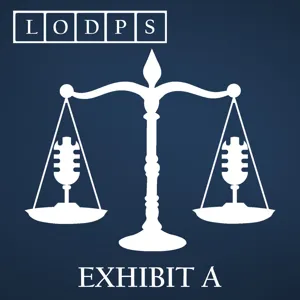Podcast Summary
Divorcing Couple's Informal Protective Order: Informal protective orders, even if privately agreed upon, are still subject to the law and can have significant consequences.
In the 2022 case of Brubacher and or Brubaker, and Strum, a husband and wife going through a divorce in Los Angeles County filed for both a dissolution and a domestic violence restraining order at the same time. They entered into an agreement for stay away orders, which they referred to as a stipulated temporary protective order. This agreement was not filed as a public record, but it was still considered a protective order under the law. The discussion highlights the complexity of family law cases and the importance of understanding the legal implications of various agreements and orders. This case serves as a reminder that even informal or privately agreed-upon protective orders are still subject to the law and can have significant consequences.
Length of Restraining Orders and Their Consequences: Judges have discretion in determining the length of restraining orders. A situational violation of the order's terms may result in a shorter restraining period, but continued harassment can put victims at risk.
The length of a restraining order can have significant consequences, and judges have discretion in determining the duration. In this case, a husband was initially granted a temporary restraining order (TRO) with certain conditions, but he allegedly violated those terms, leading to a second restraining order. The judge in the second case deemed the husband's conduct situational and granted a two-year restraining order, but the husband continued to harass his wife. The wife was also granted sole physical and legal custody of their child, which comes with a presumption against joint custody due to domestic violence. The presumption can be overcome with various factors, such as anger management classes or individual therapy. However, the judge's decision to grant a shorter restraining order, based on the belief that the husband's conduct was situational, ultimately proved to be incorrect. This case underscores the importance of considering the full context of domestic violence cases and the potential risks to victims even after restraining orders have been issued.
Strict Adherence to Restraining Orders in Divorce Proceedings: Violating a restraining order during a divorce, even through communication apps, can result in legal consequences and impact the outcome of the case.
During a divorce proceeding, if a restraining order is in place, both parties must adhere to the terms strictly. Violations, even minor ones, such as using a communication app like Our Family Wizard to scold or reprimand the other party, can lead to further legal consequences. In this case, the husband's violation resulted in a limitation of his communication privileges through the app. The divorce case continued, and the final decision, made by a different judge, determined whether the father had overcome the 3044 presumption. These events occurred over the course of several months in 2018 and 2019. The use of communication apps in divorce proceedings is becoming increasingly common, and they can be monitored by attorneys or the court to ensure compliance with restraining orders.
Renewing a Domestic Violence Restraining Order During Divorce: Follow proper procedures when renewing a domestic violence restraining order during divorce to avoid potential legal complications.
During a divorce proceeding, a domestic violence restraining order can be renewed within three months before its expiration for a period of five years or permanently. However, filing the request too early could lead to legal issues. In the discussed case, the husband did not overcome the presumption against awarding him joint custody due to past domestic violence incidents. Despite this, he had complied with the restraining order and had not committed any further acts of domestic violence. After the final judgment on the divorce, the wife filed a request to renew the restraining order, which was granted despite her filing it a month early. However, had anyone objected, she would have been in the wrong for filing too early. It's essential to follow the proper procedures when dealing with restraining orders during divorce proceedings to avoid potential legal complications.
Renewing a restraining order can have lasting consequences: A victim does not need to prove new domestic violence or a violation of the existing order to renew a restraining order, as long as they have a reasonable apprehension of future abuse.
The renewal of a restraining order can have significant and long-lasting consequences, potentially extending for life, even if the initial order was only in effect for a short period. The legal standard for granting a renewal is based on the victim's reasonable apprehension of future abuse, which can be based on the underlying incident or subsequent conduct. Unlike obtaining a new restraining order, the victim does not have to prove additional domestic violence or a violation of the existing order. In this case, the husband's harassing behavior and aggressive actions during custody exchanges, even without a violation of the order, may have contributed to the victim's reasonable apprehension of fear. The court's decision to renew the order was based on this standard, and the husband's motion in limine challenging the renewal led to an appeal.
Divorce Case Illustrates Complexities of Issue Preclusion: In a divorce case, evidence of domestic violence during the marriage cannot be excluded based on issue preclusion if the issue has not been finally determined in the divorce proceedings
During a divorce case, one party attempted to exclude certain evidence based on the legal principle of issue preclusion. The evidence included messages and testimony regarding allegations of abuse that occurred before a restraining order was issued and up until the divorce was finalized. The trial court granted the motion to exclude, but the decision was later reversed on appeal. The appellate court held that the issue of domestic violence during that time period had not been finally determined in the divorce case, allowing the evidence to be presented. This case illustrates the complexities of issue preclusion and its application in family law cases.
Misapplication of issue preclusion in restraining order case: Understanding the distinction between original and renewal issues in restraining orders and the relevance of underlying facts and findings is crucial to avoid misapplying issue preclusion.
Issue preclusion, which is the legal doctrine that prevents the relitigation of factual issues already decided in a prior case, was incorrectly applied in a case regarding the renewal of a restraining order. The trial court and court of appeals held that the issues of whether the father had overcome the presumption of domestic abuse in the initial order and whether the wife had reasonable apprehension or fear in the future were different, and the wife should have been allowed to present evidence on the underlying issue of domestic abuse during the renewal hearing. This case highlights the importance of understanding the distinction between the original issue and the renewal issue in restraining order cases, and the relevance of the underlying facts and findings supporting the initial order to the request for renewal. The courts also emphasized that the existence of the initial order is relevant to the request for renewal, and the underlying facts and findings supporting that order will often be enough proof to get a renewal. Overall, this case underscores the complexity of restraining order cases and the need for careful consideration of the underlying facts and legal issues involved.
Finding a Solution for Domestic Violence Cases in the Overburdened Legal System: The legal system's complexity and cost in domestic violence cases call for a specialized court system to ensure all parties have a fair chance to present their case without compromising efficiency.
The legal system, particularly in complex cases like domestic violence, can be costly and time-consuming due to the various players involved and the extensive evidence that needs to be presented. This has led to some pushback against long trials and strict time limits, but denying parties the opportunity to fully present their case may not be just. The consequences of a domestic violence case can be severe, impacting custody, support, and other legal matters. Therefore, it is crucial to find a solution to accommodate these cases within the overburdened legal system, potentially through a specialized court system dedicated to handling domestic violence cases.





